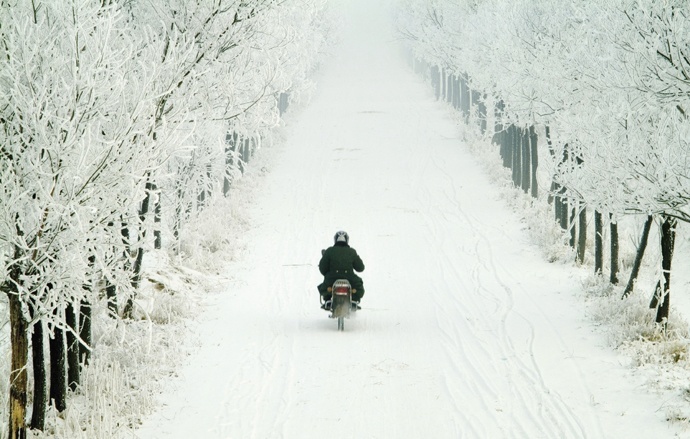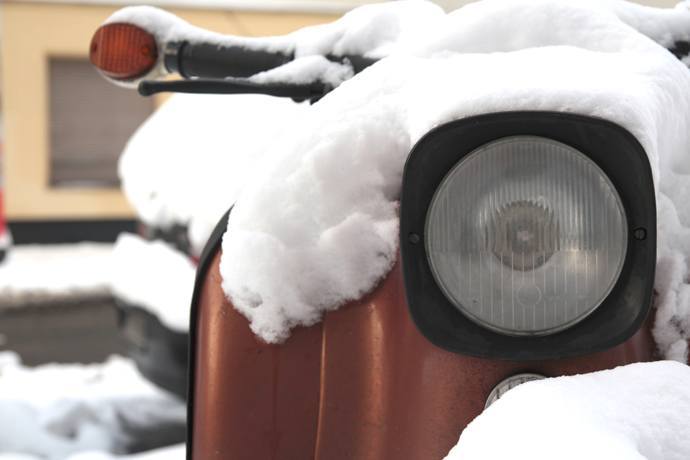Riding a motorbike in winter is a perfect way to avoid congestion and crowded public transport. And if you can master the smooth style that slippery roads demand, you’ll be honing skills that will improve your riding all year round.

Stay warm Riding a motorbike in winter
When you get cold, you lose focus, your reaction times slow and numb hands don’t work well. This is especially unfortunate when road conditions are slippery and you need your wits about you. Motorway speeds in the cold are a challenge in their own right, but urban commuting is all about layering. A good base layer keeps you warm and wicks away moisture to keep you comfortable. A neoprene chin guard is so good at keeping out the cold that you can ride with an open face lid if you have to – pair it up with a full – face and you’re ready for the arctic chill. Winter gloves are always a compromise between warmth and control sensitivity – what you choose will depend on the speed and distance of your winter rides. When things get really cold, wear a glove base layer or consider heated grips or bat mittens.
Ride smooth Riding a motorbike in winter
It is now a legal requirement that new motorcycles are sold with ABS as standard. In certain situations, the technology can be a life saver – the YouTube film below graphically illustrates the benefits of anti-lock braking systems in extremely wet conditions and when the front brake is grabbed. However, rider aids should not be relied on. An unintended consequence of safety tech can be that it can makes you feel like a better rider than you actually are – and the safety net it provides extends only so far. There is no substitute for riding within the limits of the road, the machine and your skill. In the wet, that means paying particular attention to your speed and making sure every input is as smooth as possible.
Stay dry
Once you have used a good rain suit, there’s no going back. Sure they don’t amazing, but saying goodbye to wet pants is a great feeling. Spend more than £50 and you should get a bit of kit that’s pretty much as good as a diver’s dry suit at keeping out water.
Bike prep
If your bike is water-cooled, change your coolant and use a winter mix of anti-freeze. While you are at it, inspect your hoses and check for cracks as the cold weather doesn’t do them any favours.
Tyres
Your tyres have to work hard for you in winter; roads are slippery and cold so they will take longer to get to temperature. Make certain you check them regularly for wear and pressure.
Salt
Salt can make roads slippery and attacks any and every metal surface on your bike. Wash your bike frequently and spray engine parts with a light coating of WD40. Wipe it off with a cloth and it will do an excellent job of keeping corrosion at bay.

Looking ahead
When you are riding a motorbike in winter you need to give yourself even more time to react. Looking far ahead when you ride helps you spot hazards and makes it easier to recover from a skid should your back tyre slip out. If you have to avoid an obstruction, remember to focus your sight on the path you want to take. It’s all too easy to focus on the thing you’re trying to ride around.
Breakdown cover that understands bikes
The ETA has 25 years’ experience recovering motorbikes, so whether you are looking to cover your winter commute or a summer trip to Spain, get an instant quote on motorbike breakdown & breakdown cover.
We handpick only the best local mechanics and garages around Britain to send out if you break down. We believe this way of working is efficient, environmentally friendly and helps supports local communities and economies, too.
On top of this, we offset the carbon emissions of the recovery trucks that go out to assist you, reducing the impact your breakdown has on our environment. Every breakdown policy you buy helps fund the work of our charity, the ETA Trust, which campaigns for a safer, cleaner transport future.
Discretion is the better part of valour
Being an all-weather rider means just that and thankfully in Britain, severe winter weather is relatively. But when winter conditions really deteriorate, know when to leave the keys at home.
2 Comments View now